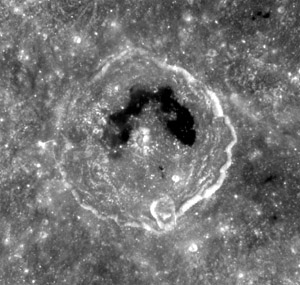Mare Hiemis
Contents
Mare Hiemis (on the floor of Schluter)
(discontinued IAU name)
| Lat: 5°S, Long: 84°W, Diam: 89 km, Depth: , Rükl: 39 |

Clementine The discontinued name Mare Hiemis referred to the dark mare patches on the floor of Schlüter, shown here in a high-Sun view.
Images
LPOD Photo Gallery Lunar Orbiter Images Apollo Images
Maps
(LAC zone 73A3) USGS Digital Atlas PDF
Description
Description: Wikipedia
Additional Information
Nomenclature
- The former IAU name meant "Winter Sea", one of a set of "four seasons" names given by Franz in his Die Randlandschaften des Mondes (1913). to previously unnamed dark patches in this area. The others were Mare Veris (Spring), Mare Aestatis (Summer), and Mare Autumni (Fall). The relevant section of Franz' map is reproduced as Figure 7 in Baum and Whitaker, 2007 (p. 132).
- This name along with Franz' other three names, was adopted into the original 1935 IAU nomenclature of Named Lunar Formations where it is #1975a. But the coordinates given for it there seem to have been 6°S / 79°W, which (as shown on the Army Map Service's LTM-2) places the feature between Schlüter and Riccioli in the vicinity of what is now known as Hartwig. The position given in the title line is from Franz' map.
- The name was deleted by G. P. Kuiper in connection with Table III of his 1960 Photographic Lunar Atlas, where (misspelled? as Mare Heimis) it is listed as one of two "small patches of dark material not worthy of separate names" (the other being Mare Parvum). These changes were approved by the IAU in 1961 (IAU Transactions XIB).
- In connection with the subsequent revisions to the IAU nomenclature attendant to the preparation of the Rectified Lunar Atlas (approved in 1964), the prominent crater on whose floor these dark patches lie was given the new name Schlüter. The authors of that work identified this crater as possibly corresponding to what had been previously known as Collated List #1962 ("Riccioli A"), which shared the same coordinates as Mare Hiemis (again, seemingly to the east of the feature illustrated here).
LPOD Articles
Bibliography